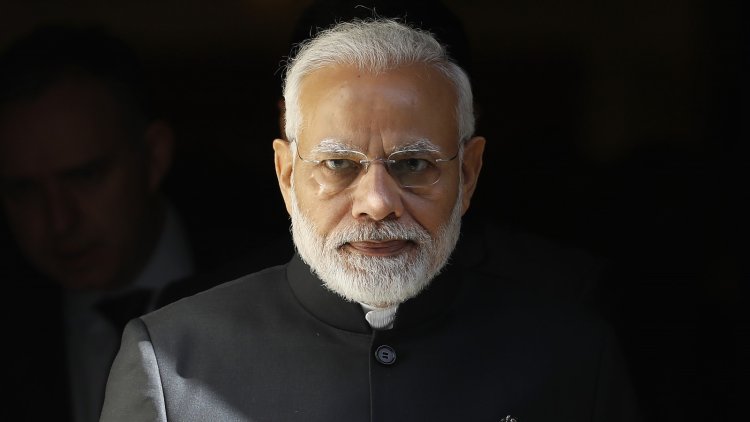The Modi Wave: An Analysis of BJP's Victory in the 2019 State Elections
"Explore the 'Modi Wave': an in-depth analysis of BJP's sweeping victory in the 2019 Indian state elections. Understand the strategies, public sentiment, and political dynamics that led to this landmark win."

Introduction
The BJP's historic victory in the 2019 state elections has made headlines across India. This victory is significant for several reasons, including the humiliating defeat of the Indian National Congress. Prime Minister Narendra Modi's leadership played a crucial role in the BJP's success, but it also raises questions about his ability to address the economic and social challenges facing the country. To move the nation forward, unity is needed to overcome these challenges.
Uttar Pradesh, the most populous state in India, holds great political importance. The BJP's convincing victory in this state demonstrates its strength and popularity among the people. Additionally, the BJP's success in retaining power in Uttarakhand and gaining power in Goa and Manipur further solidified its position as a dominant political force.
However, despite the BJP's landslide victory, India still faces numerous challenges. The devastating impact of the pandemic, widespread unemployment, acute housing shortages, and economic crisis continue to burden the country. All political parties and citizens must come together and work towards finding solutions for these pressing issues.
Looking ahead, the upcoming general elections hold immense significance. The state elections are often seen as a bellwether for the general elections, and the BJP's strong performance in these state elections positions them favourably for the upcoming national elections. It remains to be seen whether the opposition parties can unite and present a strong challenge to the BJP's dominance in 2024.
BJP's Landslide Victory and its Surprising Factors
The recent state elections in India resulted in a landslide victory for the Bharatiya Janata Party (BJP) in several states, including Uttar Pradesh, Uttarakhand, Goa, Manipur, and Punjab. This victory came as a surprise to many, considering the challenges faced by the country, such as the devastating impact of the pandemic, widespread unemployment, acute housing shortages, and economic crisis.
One of the most significant victories for the BJP was in Uttar Pradesh, the most populous state in India. The convincing win in this state not only demonstrates the strength and popularity of the BJP among the people but also solidifies its position as a dominant political force. Winning power in Uttarakhand, Goa, and Manipur further adds to their strong performance.
While the BJP's victories are impressive, it is also essential to acknowledge the historical significance of the Aam Aadmi Party's (AAP) victory in Punjab. The AAP's victory in this state, which the Congress party had previously controlled, is a significant development in Indian politics and highlights the rise of regional parties.
Several factors contributed to the BJP's success in these elections. One of the key factors is the likability and attachment that people have towards the BJP as a party. Despite the nation's economic crisis, the BJP has a strong following in India and many people trust Prime Minister Narendra Modi to lead.
The BJP's efficient delivery of welfare schemes and their focus on development issues also played a role in their victory. These schemes, aimed at helping the poor and marginalized communities, resonated with voters who benefited from them, leading to their support for the BJP.
However, it is crucial to note that despite the BJP's triumph, India still faces various challenges, including economic recovery, unemployment, and social issues. All political parties and citizens need to come together and work towards finding solutions for these pressing issues.
In conclusion, the BJP's landslide victory in the state elections can be attributed to factors such as the likability of the party, efficient welfare schemes, and focus on development issues. While this victory positions the BJP favourably for the upcoming general elections, it remains to be seen whether the opposition parties can unite and present a strong challenge in 2024.
Challenges faced by the Indian National Congress
The recent state elections have brought to light a series of challenges faced by the Indian National Congress (INC). The party suffered a humiliating defeat across multiple states, leading to a loss of trust and support from voters.
One of the major challenges faced by the INC was its inability to address the economic crisis and unemployment plaguing the country. Despite widespread joblessness and acute housing shortages, the party failed to connect with voters and provide effective solutions.
The defeat in the state elections serves as a wake-up call for the INC, highlighting the need for introspection and change within the party. The party must assess its policies, leadership, and strategies to regain the trust of the people.
The loss also raises questions about the party's ability to adapt to the changing political landscape. The BJP's efficient delivery of welfare schemes and focus on development issues played a significant role in their victory. The INC must re-evaluate its approach and find ways to connect with voters on key issues.
To bounce back and present a strong challenge to the BJP's dominance in the upcoming general elections, the INC must undergo a process of self-reflection and rejuvenation. This includes redefining its vision, addressing internal conflicts, and reconnecting with the aspirations of the people.
Overall, the challenges faced by the Indian National Congress necessitate a period of soul-searching and transformation. Only through introspection and change can the party rebuild its credibility and effectively address the pressing issues facing the country.
The Impact of Economic Crisis and Unemployment on Voting Patterns
The economic crisis and high unemployment rates have had a significant impact on voting patterns in India. As job seekers and small businesses face numerous challenges, public frustration and protests have become more prevalent. However, despite these difficulties, voters have prioritised party loyalty over economic concerns, leading to the continued popularity of Prime Minister Modi and the Bharatiya Janata Party (BJP).
Challenges faced by job seekers and small businesses
Jobseekers in India have been facing immense challenges in finding employment. The pandemic has led to widespread unemployment, leaving many individuals struggling to make ends meet. Small businesses, which are often the backbone of the Indian economy, have also been hit hard. Many have gone bankrupt and shut down, further exacerbating the economic crisis.
Public frustration and protests
The economic crisis and high unemployment rates have fueled public frustration and led to protests across the country. Jobseekers, in particular, have taken to the streets to demand better job opportunities and economic support. However, despite these protests, the BJP has managed to maintain its popularity among the public.
Voters prioritise party loyalty over economic concerns.
One surprising trend in voting patterns is that voters have prioritised party loyalty over economic concerns. Many people in India continue to support the BJP and have faith in Prime Minister Modi's leadership, regardless of the economic challenges facing the country. The BJP's efficient delivery of welfare schemes and focus on development issues have resonated with voters and contributed to their continued support.
Popularity of Prime Minister Modi despite economic challenges
Despite the economic challenges and high unemployment rates, Prime Minister Modi remains popular among the Indian public. Many people have faith in his leadership and believe that he can overcome the economic crisis and lead the country towards prosperity. The BJP's strong performance in the state elections is a testament to Modi's popularity and the party's ability to connect with voters on non-economic issues.
The State of Uttar Pradesh and its Political Significance
Uttar Pradesh, the most populous state in India, holds great political importance. With a population of 230 million people, it can determine the cross-currents and contours of Indian politics. If Uttar Pradesh were a country, it would be the fifth most populous nation in the world, bigger than Pakistan and equivalent to Germany, the United Kingdom, and France combined.
No political party in India can rule without securing substantial support in Uttar Pradesh. The state has given India nine prime ministers, including Prime Minister Narendra Modi. It is considered a bellwether state, often seen as a predictor of the outcome of the national elections.
The recent landslide victory of the Bharatiya Janata Party (BJP) in Uttar Pradesh further solidifies their position as a dominant political force. The BJP's convincing win in this state demonstrates their strength and popularity among the people.
Uttar Pradesh's impact on Indian politics goes beyond its population and electoral significance. The state is also known for its regional parties, which play a crucial role in shaping the political landscape. These regional parties, such as the Samajwadi Party and the Bahujan Samaj Party, focus on specific local issues and have a strong influence on the state's politics.
The state elections in Uttar Pradesh are often seen as a bellwether for the general elections. The BJP's strong performance in these state elections positions them favourably for the upcoming national elections in 2024. However, it remains to be seen whether the opposition parties can unite and present a strong challenge to the BJP's dominance.
The Effect of the COVID-19 Pandemic on Elections and Governance
The COVID-19 pandemic has had a profound impact on elections and governance in India. The challenges faced by the country during this health crisis have tested the leadership and decision-making abilities of the government.
Challenges faced by India during the pandemic
India faced numerous challenges during the pandemic, including the devastating impact of the virus, widespread unemployment, acute housing shortages, and an economic crisis. These challenges have greatly impacted the lives of the Indian people and have created an atmosphere of uncertainty and fear.
The government's response to the health crisis
The government's response to the health crisis has been a topic of debate and scrutiny. While some applaud the efforts made by the government to control the spread of the virus and provide medical assistance, others criticise the lack of preparedness and mismanagement.
Unemployment, the economic crisis, and their influence on voting
The high rates of unemployment and economic crisis have had a significant influence on voting patterns in India. Despite the hardships faced by job seekers and small businesses, voters have prioritised party loyalty over economic concerns. Many people in India continue to support the ruling party, the BJP, and have faith in Prime Minister Narendra Modi's leadership.
The need for economic revival and recovery
To address the economic crisis and unemployment, there is a critical need for economic revival and recovery. The government must focus on implementing measures that will stimulate economic growth, create job opportunities, and provide support to struggling businesses. The revival of the economy will not only improve the lives of the people but also restore faith in the government.
In conclusion, the COVID-19 pandemic has presented unprecedented challenges for elections and governance in India. The government's response to the health crisis and the impact of the economic crisis and unemployment on voting patterns have highlighted the need for effective leadership, economic revival, and recovery. All political parties and citizens must come together and work towards finding solutions for these pressing issues to ensure a better future for the country.
The Impact on Traditional Crafts and Small Businesses
The COVID-19 pandemic has had a significant impact on traditional crafts and small businesses in India. Many artisans and craftsmen have struggled to keep their businesses afloat during these challenging times. The restrictions and lockdowns imposed to curb the spread of the virus have severely affected the production and sale of traditional crafts.
Struggles faced by traditional crafts during the pandemic
Traditional crafts, such as Chikankari in Lucknow, have faced numerous struggles during the pandemic. With limited or no orders, artisans have had to face financial difficulties and uncertainty about the future of their craft. The closure of markets and the cancellation of events and exhibitions have further affected their ability to sell their products.
The case of Chikankari Craft in Lucknow
Chikankari, a traditional embroidery craft in Lucknow, has a rich history and is known for its intricate designs on fabrics. However, the pandemic has hit this craft hard. Many Chikankari businesses were forced to shut down due to a lack of demand and an inability to sustain operations. Artisans who relied on this craft for their livelihoods have struggled to find alternate sources of income.
Stories of artisans and small business owners
Artisans and small business owners have shared stories of hardship and resilience during the pandemic. Many have had to take up odd jobs or rely on government schemes for support. Despite the challenges they face, these individuals have shown immense determination to preserve their craft and keep their businesses alive.
Government schemes and their limited reach
The government has introduced various schemes to support small businesses and artisans during the pandemic. However, there have been limitations in the reach and effectiveness of these schemes. Many artisans have found it difficult to access financial aid or navigate the bureaucratic processes involved.
The COVID-19 pandemic has posed significant challenges to traditional crafts and small businesses in India. Artisans and craftsmen have faced financial difficulties, and government schemes have had limited reach. It is important to support and promote these traditional crafts to preserve India's rich cultural heritage and provide livelihood opportunities to artisans.
The Decline of the Indian National Congress
The recent state elections have brought to light a series of challenges faced by the Indian National Congress (INC). The party suffered a humiliating defeat across multiple states, leading to a loss of trust and support from voters.
Congress' electoral defeats and loss of trust
One of the major challenges faced by the INC was its inability to address the economic crisis and unemployment plaguing the country. Despite widespread joblessness and acute housing shortages, the party failed to connect with voters and provide effective solutions.
Failure to connect with voters and address their concerns
The defeat in the state elections serves as a wake-up call for the INC, highlighting the need for introspection and change within the party. The party must assess its policies, leadership, and strategies to regain the trust of the people.
The importance of leadership and a clear vision
The loss also raises questions about the party's ability to adapt to the changing political landscape. The BJP's efficient delivery of welfare schemes and focus on development issues played a significant role in their victory. The INC must re-evaluate its approach and find ways to connect with voters on key issues.
The rise of regional parties as an alternative
To bounce back and present a strong challenge to the BJP's dominance in the upcoming general elections, the INC must undergo a process of self-reflection and rejuvenation. This includes redefining its vision, addressing internal conflicts, and reconnecting with the aspirations of the people.
Overall, the challenges faced by the Indian National Congress necessitate a period of soul-searching and transformation. Only through introspection and change can the party rebuild its credibility and effectively address the pressing issues facing the country.
The Controversy of Community Polarisation
Accusations of communal polarisation against the BJP:
One of the major controversies surrounding the BJP is the accusation of communal polarisation. Critics argue that the party's policies and rhetoric have contributed to the division of the country along religious lines. They claim that the BJP has prioritised the interests of the Hindu majority, leading to the marginalisation of minority communities, particularly Muslims.
Countering the Polarisation Narrative:
On the other hand, supporters of the BJP argue that the party's focus on Hindu consolidation is not aimed at polarising the country but rather at addressing historical imbalances and inequalities. They believe that the BJP's emphasis on cultural and national pride is necessary to build a strong and united India.
Different perspectives on Hindu consolidation:
There are different perspectives on the concept of Hindu consolidation. Critics view it as a form of majoritarianism that undermines the secular fabric of the country. They argue that it promotes a sense of cultural superiority and the exclusion of minority communities. However, supporters argue that Hindu consolidation is necessary to protect Hindu interests and values in a country with a Hindu majority.
The role of organisations like RSS:
The Rashtriya Swayamsevak Sangh (RSS), a Hindu nationalist organisation, plays a significant role in shaping the ideology and policies of the BJP. Critics argue that the RSS promotes a divisive and exclusionary agenda, while supporters believe that it serves as a cultural and social organisation that fosters patriotism and national unity.
The controversy of communal polarisation surrounding the BJP is a complex issue with differing perspectives. Critics argue that the party's policies and rhetoric contribute to the division of the country along religious lines, while supporters believe that Hindu consolidation is necessary to address historical imbalances and protect Hindu interests. The role of organisations like RSS further adds to the debate. It is important to have an open and informed dialogue to address these concerns and work towards a more inclusive and united India.
Looking Ahead: Modi's Leadership and Future Elections
As Prime Minister Narendra Modi continues to enjoy an unchallenged position as a national leader, the upcoming general elections hold immense significance. The recent state elections have solidified the Bharatiya Janata Party's (BJP) dominance, positioning them favourably for the national elections in 2024.
Modi's strong leadership and likability among the people have played a crucial role in the BJP's success. Despite the challenges faced by the country, including the economic crisis and widespread unemployment, voters have prioritised party loyalty over economic concerns. Many people in India continue to support the BJP and have faith in Modi's ability to lead the nation towards prosperity.
One of the key factors contributing to the BJP's victories is their efficient delivery of welfare schemes and focus on development issues. These schemes, aimed at helping the poor and marginalised communities, have resonated with voters who have benefited from them. The BJP's ability to address the needs of the people has further solidified their position as a dominant political force.
Meanwhile, the opposition parties are facing significant challenges. The Indian National Congress (INC) has suffered a series of defeats and is in a state of crisis. The party's inability to connect with voters and address pressing issues such as the economic crisis and unemployment has led to a loss of trust and support.
However, for a healthy democracy, it is crucial to have a strong and united opposition. The fragmented state of the opposition parties raises questions about their ability to present a formidable challenge to the BJP's dominance in future elections. There is a need for the opposition parties to come together, redefine their vision, and address internal conflicts to regain the trust of the people.
Looking forward, India needs to focus on inclusive growth and progress. While the BJP's strong performance in the state elections positions them favourably for the upcoming general elections, it is important to address the pressing economic and social challenges facing the country. The government must prioritise economic recovery, job creation, and support for small businesses to ensure a better future for all citizens.



 admin
admin 










